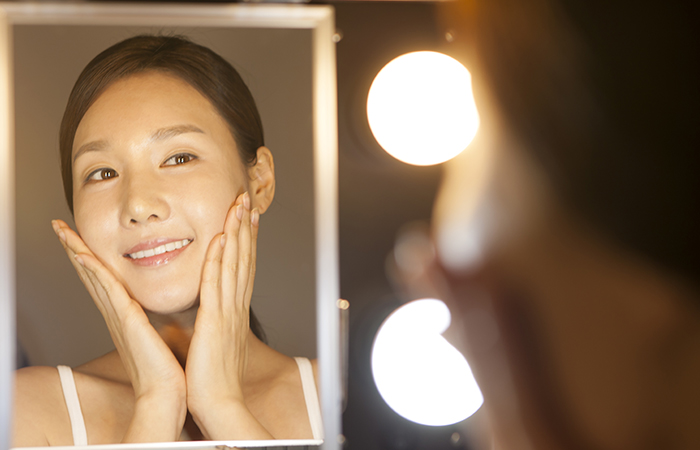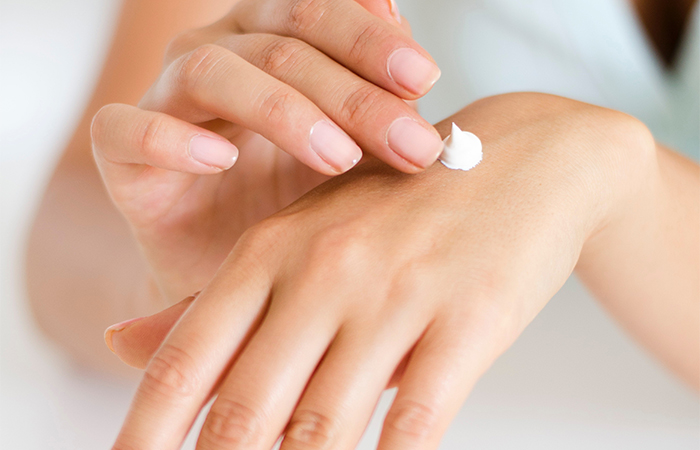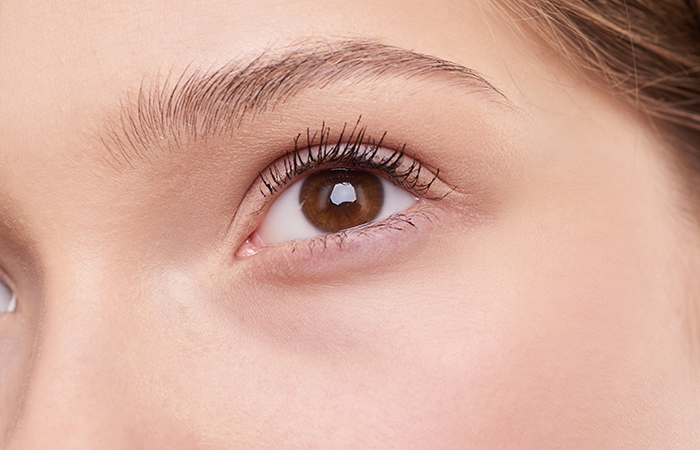The Daily Vanity team started working from home pretty early – since February – because of the COVID-19 pandemic, in order to protect our health.
Since spending more time at home, I find that I became more conscientious with my skincare routine, wear less makeup, are less exposed to environmental elements because of less commuting, and am getting a little more sleep (if I’m not on a late-night TV show-binge). All these sound like a 101 for how to get better skin.
I have been breaking out more since I started staying at home 24/7

I don’t usually suffer from acne but quarantine life seems to be taking a toll on my skin. These are some new and healing blemishes on my skin. Photos were taken on the same day.
However, I was surprised to notice that I was breaking out more than before. While I used to see just one or two zits just before my period, in the last four weeks, I have had at least five or six pop out from nowhere. The areas on my cheeks near my nose also look a bit inflamed and bumpy.
During a Facebook and Instagram live-streaming session last week with Daily Vanity readers, I shared these skin woes and found that many of you also noticed the same problem – breaking out more since working from home! What’s going on?!

Dr. Teo Wan Lin answered our questions about acne.
Feeling very bothered by these questions, I checked in with dermatologist Dr. Teo Wan Lin, to find out what could be causing occurrences of acne during this period.
“Healthy skin and troubled skin are very rarely just due to environmental or lifestyle consequences, but more determined by an individual’s genetic makeup”, she told me when I raised this question.
“The cause of eczema and acne, which are the commonest skin problems experienced by people in Singapore, are actually genetically influenced, so whether or not they’re going out doesn’t make a difference,” she adds.
Does staying home more lead to better skin?

But I’ve been more conscientious with my skincare routine now and am wearing less makeup, surely that should help make my skin look better? I protested.
While Dr. Teo agrees that a better skincare routine may help in boosting skin hydration and if your products include cosmeceutical ingredients. However, wearing less makeup shouldn’t make an impact.
“I do not think any of the makeup that’s being sold in this era (unlike the comedogenic ones made in maybe the early 1990s) is actually causing skin problems,” she explains.
There’s some exception, though. Women who are acne-prone can see better skin when they apply less makeup because there is less grime on their skin.
She explains that makeup may sometimes mix with the oils on our skin, and together with our humid climate and sweat, creates the perfect culture on our skin to breed bacteria – which is what causes acne to occur.
“While it usually doesn’t cause problems for people who suffer from acne, for people who do, this can exacerbate the acne problem because of secondary bacterial infections,” she adds.
Why am I seeing more pimples during the Circuit Breaker then?
But if my genetics determine my susceptibility to acne, why am I seeing more pimples now than before? I was still puzzled.
She points to one possibility: stress.
“One thing that can definitely make all skin conditions worse is stress. So if staying at home makes you more stressed or less stressed, it will have the appropriate effects on the skin,” she says.

She further explains that changes in our daily routines and lifestyle – especially major ones, like what we have to go through during the Circuit Breaker – can lead to stress in our body, even if we are not “feeling” it.
Other possible reasons: lack of sleep and frequent wearing of masks.
She said that the latter reason can lead to a type of acne called “occlusion acne”, which are usually seen on athletes who have to wear helmets or facial gear.
“I strongly recommend everyone to wear a mask when you’re out of your house, out of social responsibility, but you have to find a way to tackle the acne problem, because face masks are here to stay.”
One way to mitigate this is to have a breathable barrier between the mask and your skin, such as a mask slip.
“My team has created a mask slip, where you can put in your surgical mask. This allows the mask to be reused and it wicks sweat away,” she recommends. The material used is hypoallergenic and the mask slip can help reduce the risk of developing occlusion acne.
How should I treat my pimples?

After hearing what Dr. Teo shared, I think I’d point my recent acne problem to stress and lack of sleep. Having to do more meal-planning, cooking, and washing, on top of caring for my child and working from home, can take a toll on me and in order to still feel like I get a bit of me-time in between these tasks, I find that I sleep later than before.
The fact that I get to sleep in later doesn’t compensate enough for it. The gloomy news that we see every day and the worry for the uncertain future definitely add to this stress.
But I guess I could strike off one thing that is stressing out if I can take care of the pimple crisis that’s happening on my face first.
Dr. Teo explains that there are two types of outcomes for pimples that had already appeared and come to the surface.
Scenario 1: Pus and debris get extruded, the pimple flattens out and leaves a mark that eventually fades.
Scenario 2: It gets bigger and bigger and becomes cystic, which feels like it’s buried deep under the skin.
Scenario 2 is what we want to avoid. So how do we prevent that?

“If you just have one or two pimples a month, that’s physiological acne, which can be well managed with over-the-counter topical acne medication that has active ingredients like benzyl peroxide, salicylic acid, and some has sulfur-based solutions,” she says.
But she thinks that these solutions only work for very, very mild acne.
“If you have any more than five (per month), you may seriously need prescription medication, whether in the form of creams or oral medication or you may just end up in a vicious cycle,” she cautions.
“Because if you have more than five pimples a month, it means that under your skin you have at least 20 pimples or so, gradually rising to the surface and they take turns to appear. They don’t (all) appear overnight because micro-comedones under the skin rise to the surface through a process of inflammation and it takes one to two weeks to appear” she explains, saying that this is why some people appear to struggle with an acne problem that doesn’t seem to go away.

This is why she doesn’t prescribe over-the-counter medications in her practice anymore because these products tend to cause irritation, sensitivity, redness, and even burning and stinging, and these side effects outweigh the benefits.
So for more serious cases, she proposes using “anti-inflammatory pimple creams that have active botanical ingredients instead of these harsh chemical ingredients which work by drying out the skin.”
She says, “If you think of a pimple as an injury to the skin, which it really is, you’d want it to heal faster”. Serine and Methionine are two of the ingredients to look out for to help reduce inflammation and repair the wound.
“The second thing (to tackle) is oil production, which worsens acne and causes it to become more inflamed because it creates a perfect breeding ground for bacteria, leading to secondary bacterial infections,” she continues.
She says that Chlorella Vulgaris, an algae extract, can help reduce oil gland activity, and a few types of topical antibiotics can help kill surface bacteria.
“However, I think it is important to highlight that these (topical antibiotics) lose efficacy after a maximum of three months or so because the body develops resistance against them.”
So to use them or not? She advises that you speak to your dermatologist to make a decision.

For a more sustainable solution, she recommends retinoid creams, which is a type of prescription medication. Whether it is Differin or Adapalene, “These,” she says, “all work by treating the micro-comedones under the surface of the skin by bringing them to the surface of the skin in the first one to two months before they start suppressing the growth of micro-comedones.”
She further advises “The gold standard for acne treatment is actually medical (as opposed to facial and laser treatments), because it’s an inflammatory condition, so there are a variety of oral medications available.
What if you’re thinking of facials like micro-dermabrasion, chemical peels or certain lasers that help to shrink the oil gland activity?
“These do work, but they’re more adjunct to medical treatments and they’re not essential services during the Circuit Breaker period,” she says.
She recommends those who are suffering from acne to get it evaluated by an accredited dermatologist offering tele-dermatology, and have the medication shipped to you so you can get started on it.
“If you catch the acne breakout at an early stage, you can get rid of it with just prescription topicals alone, but if it’s more advanced, then a short course of antibiotics in the early stages would be effective.”
What else can I do to prevent acne during the Circuit Breaker?

We asked Dr. Teo for some final skincare tips and advice so we can start seeing better skin days while staying home.
“For acne, I think it’s very very important that you use an anti-bacterial cleanser,” she recommends.
She advises that we use a micellar formula or an oil-based emulsion to dissolve oil-soluble pigments from makeup, and then double-cleanse with an anti-bacterial cleanser thereafter.
“This second stage of cleansing would really benefit acne-prone skin if done correctly.”
Apart from the right skincare products, Dr. Teo says that “The other aspect that should not be neglected is your diet.”
She explains that almost everybody with problematic skin who starts on a medical treatment would get well as long as they comply with the treatment, “but the rate of recovery as well as the sustainability of positive effects is significantly better in the group where they are conscientious with their diet.”
She shares that diets high in trans fat (like deep fried foods), dairy products, and sugary foods are pro-inflammatory, which can exacerbate your underlying acne problems, so these are to be avoided.
“Take an antioxidant-rich diet from natural sources like blueberries and olive oil”, she advises. It ensures the healthy functioning of body tissues in order to fight free radicals from environmental pollution, UV exposure, and to slow down biological ageing.
Dr. Teo Wan Lin is a Ministry of Health accredited dermatologist and practises at TWL Specialist Skin & Laser Centre.


